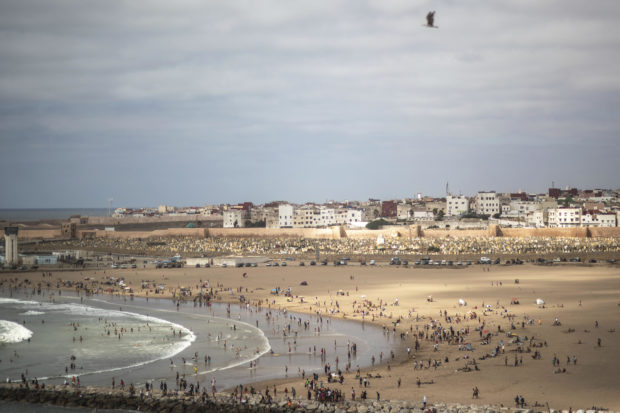
In this Friday, June 26, 2020, file photo, people gather at a reopened beach on the first weekend after lockdown measures were lifted in Sale, Morocco. Morocco will start gradually reopening its air and maritime borders next week after one of the world’s strictest border lockdowns, which trapped tourists inside the country and left thousands of Moroccans stranded abroad and unable to come home. Only Moroccan citizens and expatriates living in Morocco will be allowed to travel in the first stage of the reopening starting July 14. (AP Photo/Mosa’ab Elshamy, file)
RABAT, Morocco — Morocco will start gradually reopening its air and maritime borders next week after one of the world’s strictest border lockdowns, which trapped tourists inside the country and left thousands of Moroccans stranded abroad and unable to come home.
Only Moroccan citizens and expatriates living in Morocco will be allowed to travel in the first stage of the reopening starting July 14, according to a government statement Thursday.
National airlines will schedule as many flights as necessary to return Moroccans living abroad as well as foreigners living in Morocco. Passengers are required to present both a PCR virus test taken within fewer than 48 hours of the flight, as well as an antibody test, before boarding planes heading for Morocco.
Ferries from the French port Sete and Italian port Genoa will be allowed to resume serving Moroccan ports. All other ports will be excluded from this operation for now.
Moroccan citizens and foreign residents will be able to leave Morocco by air and sea.
Morocco abruptly suspended all international passenger flights and passenger ships to and from its territory on March 15. Tourists scrambled to get out — and Moroccans abroad struggled to come home.
While other countries also closed borders to keep out the virus, Morocco went even farther, barring its own citizens from coming home in hopes of limiting the risk of coronavirus arriving on Moroccan soil and overwhelming its under-prepared hospitals.
Under pressure from thousands of stranded Moroccans, the government started gradually letting some back in during recent weeks.
Morocco will start opening mosques next week, too, though weekly Friday prayers will remain banned.
When mosques reopen starting July 15, Morocco’s religious authority called on the faithful to wear masks, use personal prayer mats and uphold social distancing during prayers and outside mosques.
Morocco hasn’t announced when churches and synagogues will open.
Morocco has so far recorded more than 14,000 coronavirus cases, and outbreaks within families and factories have complicated efforts to limit the spread.
Local authorities in the coastal city of Safi were forced to put their city back on lockdown earlier this week, forcing more than 308,000 citizens to stay home, after an outbreak in a fish conservation factory. Outbreaks also occurred in a Renault factory in Tangier and in a strawberry plant in Kenitra, where 457 strawberry pickers and workers were affected.